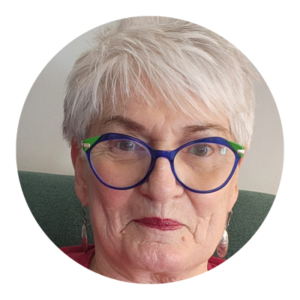

Volunteer work has always been important to Donna Weldon, who has been engaged in several volunteer roles and community initiatives. After working as a registered dietitian for more than 30 years, Donna retired in 2017, delighted to spend more time with her grandchildren, twin girls who now live in Guelph. As a retired health professional, Donna missed the opportunity to learn new things and exchange ideas with colleagues about research. The Collaborative offers her this opportunity as well as the chance to apply her knowledge, skills, and experiences to influence policy impacting older adults.
Fun Facts
Hometown: Windsor, ON
Favourite travel destination: I love seeing new cultures, meeting new people, and seeing the different environments in which people live. And I’ve been really attracted to Europe. After I retired in 2017, I walked the Camino, through Portugal, from Fatima to Santiago de Compostela.
As an older adult what inspired you to get involved at the Collaborative?
I joined the Collaborative in November 2019 and since it was just before the pandemic started, our contact was all done through Zoom. We were a very small group initially and, I believe, we were all women at the time. Since then, it has expanded nicely to include different people from different backgrounds. And I really appreciate that because there’s such a diverse way of thinking about things and to reflect on what everyone’s life experiences are.
At the time, I was looking for something to do with my brain, and somebody I know who works at the university, connected me to the Collaborative. It was the intellectual challenge that I was seeking and what I’ve gotten out of the Collaborative. It’s been really interesting to be involved.
What issues do you think most affect the quality of life of older adults as they age?
Physical fitness.
All the research points to this – and it’s both about your mind and your body. I often see people who are probably my age, however their ability to move and function are quite limited and, I think, oh I must be a lot younger than them, but in fact I am not.
I think I’ve been a lifelong seeker of physical activity and, I’m no star, believe me, but it has always been a part my life to go to a gym and work out. And while I love the social part of it, the goal was always to be fit into old age.
I have to tell you… at one point I was a dietitian doing home care and I went to visit a husband and wife. As I drove up, the woman was outside raking leaves. When she came inside, she sort of “jumped” into a chair. And I was just so impressed. She was 80 years old! Her level of fitness has been an inspiration to me all these years. She made me realize that we can all age well if we keep active. So, I’m going for a walk this afternoon.
Also, I think that the sense of loneliness as you age can be a real struggle. I came from a family of eight and, as an extrovert, that suited me well. So, learning to be comfortable alone has taken some work. I enjoy the days when I see nobody and go nowhere, but it certainly was a learning curve to get here. We all face being alone at some point but dealing with the sense of loneliness is a common narrative and can be very painful. Coping with it takes honest work.
As an extrovert, I need a certain level of social contact and if I don’t get that, I can start to go into dark places. So, if I’m feeling like that, I try to e-mail somebody or plan a coffee date or something just to stay connected. And that’s easier said than done. Not everybody has a large social circle, so it can take some effort. It means you have to get out and get outside of yourself.
If you could change one thing about the services and supports in healthcare that are available to older adults, what would it be?
Universal healthcare.
And when I say that, I mean medical care, dental care, and eye care. Fortunately, in Ontario we do have a drug coverage program for eligible seniors.
When my sister turned 87 in 2023, I reminded her that she was eligible to get her teeth cleaned (through the Canadian Dental Care Plan), which she was quite thrilled about. I’m so happy that the federal government is doing this because as we age so do our teeth. Dental health ends up being a real challenge in later years
And in 2024, the government will be integrating more and more age groups so that all eligible seniors (65+) will have access to the dental program. It will be interesting to see how this rolls out.
A couple of years ago, I had to replace a front tooth. An implant was going to cost me $5000. And what always stood out to me through that process was what about people who can’t manage that kind of financial burden? It’s wrong, you know, because health issues in your mouth affect your whole body.
I was asked to participate in the National Oral Health Research Strategy Patient and Public Consultation who are looking at what kinds of research they should be doing as time goes on. And one of my concerns was what if the federal government changes, and the new government decides to cancel the dental program? I think the only way we prevent that is by ensuring that the program becomes part of the Healthcare Act. Whether that is possible, I don’t know. But it does concern me.
All these things that adults need in older life need to be accessible, because, of course, many of us don’t ’make as much money in our senior years as we did when we’re a working person. It can be very challenging.
What advice would you give to researchers who are interested or partnering with older adults in aging-focused research?
I would say to young researchers “be patient”. It’s certainly true that as you age your thought processes slow down and it takes more time to process information and formulate your thoughts. When you’re younger, stuff just comes to you, but you also need to realize that that’s not true for an older person. So, take the time; and respect that they aren’t going at your pace.
What three words would you use to describe your experience at the Collaborative?
Interesting, challenging, and diverse.
